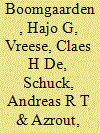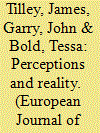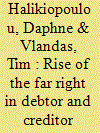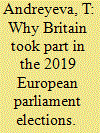| Srl | Item |
| 1 |
ID:
121750


|
|
|
|
|
| Publication |
2013.
|
| Summary/Abstract |
News about the European Union (EU) looks different in different countries at different points in time. This study investigates explanations for cross-national and over-time variation in news media coverage of EU affairs drawing on large-scale media content analyses of newspapers and television news in the EU-15 (1999), EU-25 (2004) and EU-27 (2009) in relation to European Parliament (EP) elections. The analyses focus in particular on explanatory factors pertaining to media characteristics and the political elites. Results show that national elites play an important role for the coverage of EU matters during EP election campaigns. The more strongly national parties are divided about the EU in combination with overall more negative positions towards the EU, the more visible the news. Also, increases in EU news visibility from one election to the next and the Europeanness of the news are determined by a country's elite positions. The findings are discussed in light of the EU's alleged communication deficit.
|
|
|
|
|
|
|
|
|
|
|
|
|
|
|
|
| 2 |
ID:
083266


|
|
|
|
|
| Publication |
2008.
|
| Summary/Abstract |
Abstract. One of the most influential explanations of voting behaviour is based on economic factors: when the economy is doing well, voters reward the incumbent government and when the economy is doing badly, voters punish the incumbent. This reward-punishment model is thought to be particularly appropriate at second order contests such as European Parliament elections. Yet operationalising this economic voting model using citizens' perceptions of economic performance may suffer from endogeneity problems if citizens' perceptions are in fact a function of their party preferences rather than being a cause of their party preferences. Thus, this article models a 'strict' version of economic voting in which they purge citizens' economic perceptions of partisan effects and only use as a predictor of voting that portion of citizens' economic perceptions that is caused by the real world economy. Using data on voting at the 2004 European Parliament elections for 23 European Union electorates, the article finds some, but limited, evidence for economic voting that is dependent on both voter sophistication and clarity of responsibility for the economy within any country. First, only politically sophisticated voters' subjective economic assessments are in fact grounded in economic reality. Second, the portion of subjective economic assessments that is a function of the real world economy is a significant predictor of voting only in single party government contexts where there can be a clear attribution of responsibility. For coalition government contexts, the article finds essentially no impact of the real economy via economic perceptions on vote choice, at least at European Parliament elections.
|
|
|
|
|
|
|
|
|
|
|
|
|
|
|
|
| 3 |
ID:
138886


|
|
|
|
|
| Summary/Abstract |
While the 2014 European Parliament elections were marked by the rise of parties on the far right-wing, the different patterns of support that we observe across Europe and across time are not directly related to the economic crisis. Indeed, economic hardship seems neither sufficient nor necessary for the rise of such parties to occur. Using the cross-national results for the 2004, 2009 and 2014 EP elections in order to capture time and country variations, we posit that the economy affects the rise of far right-wing parties in more complex ways. Specifically, we compare the experience of high-debt countries (the ‘debtors’) and the others (the ‘creditors’) and explore the relationship between far right-wing party success on the one hand, and unemployment, inequality, immigration, globalisation and the welfare state on the other. Our discussion suggests there might be a trade-off between budgetary stability and far right-wing party support, but the choice between Charybdis and Scylla may be avoided if policy-makers carefully choose which policies should bear the brunt of the fiscal adjustment.
|
|
|
|
|
|
|
|
|
|
|
|
|
|
|
|
| 4 |
ID:
170735


|
|
|